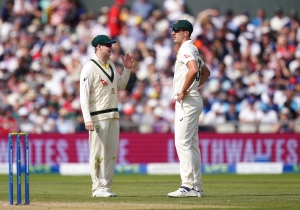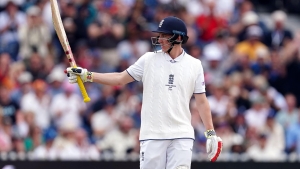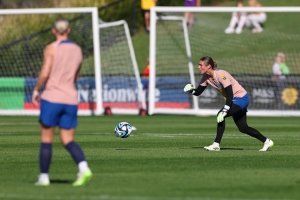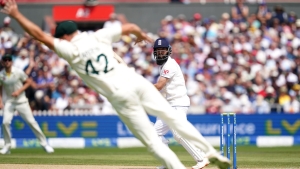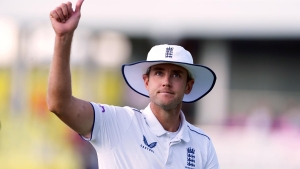Jonny Bairstow was stranded one short of a dazzling Ashes century and Mark Wood blew a hole in Australia’s top order as England continued their fourth Test domination of Australia.
Bairstow was left high and dry on 99 not out from just 81 balls as England blazed their way to 592 on day three at Emirates Old Trafford, building on Zak Crawley’s 189-run blitz on Thursday.
That gave them a commanding lead of 275 over their increasingly beleaguered rivals, who made an uncertain 113 for four in reply and now find themselves relying on a poor weekend weather forecast to escape with a draw.
Wood, once again hurdling the 90mph barrier to unsettle the Australians, claimed three for 17 as Usman Khawaja, Steve Smith and Travis Head all succumbed.
Bairstow has had an eventful series – falling victim to a deeply controversial stumping at Lord’s, making some costly wicketkeeping errors and even tussling with a Just Stop Oil protester – but put himself in the thick of things for all the right reasons with an outstanding innings.
England were 67 ahead overnight and 120 in front when he arrived at the crease, but his dominant strokeplay piled on the misery for the Australians.
Despite a ring of boundary riders trying to shut him down he hammered four sixes and 10 fours to carry his side to their highest Ashes total at home since 1985.
Bairstow’s controlled aggression was deserving of a hundred but, after expertly managing the strike for the majority of his time with the tail, he found himself stuck at the non-striker’s end after deciding against a risky second that could have got him there.
Last man James Anderson was trapped lbw by Cameron Green’s next ball, stopping Bairstow in his tracks and making him just the third English batter to finish undefeated on 99.
Sir Geoffrey Boycott (1979) and Alex Tudor (1999) are the only others to suffer that fate, but Bairstow was grinning broadly as he left the pitch.
He has been eyeing a measure of revenge ever since his divisive dismissal in the second Test at Lord’s and helped himself to a healthy portion.
Mitchell Starc and Josh Hazlewood were both on the receiving end of muscular sixes thrashed into the leg-side, but Bairstow would have taken most satisfaction from the pair of furious blows off Pat Cummins, the Australia captain who refused to withdraw the appeal at Lord’s.
Cummins, who has looked bereft of energy and inspiration this week, ended up with figures of one for 129, the worst analysis of his career.
Bairstow also took liberties against fellow wicketkeeper Alex Carey, the man who threw down his stumps to kick off the ‘spirit of cricket’ rumpus in the first place.
In a bid to shield Anderson from the strike, Bairstow charged through for a bye on several occasions despite the ball carrying cleanly through to Carey’s gloves.
To the audible delight of the crowd, Carey repeatedly failed to hit the target from exactly the same range he had done so two games ago.
England’s day started in typically lively fashion, with a morning session that added 122 runs and four wickets to the scoreboard in just 24 overs.
There were half-centuries for Ben Stokes (51) and Harry Brook (61), and some success for Hazlewood, who finished with five for 126 amid the carnage.
Bairstow was afforded a centurion’s ovation as he left the field, the Manchester crowd overlooking the small matter of a missing single, but did not linger over the moment. His mind was already trained on the next job, with 12 overs to bowl before tea.
Wood was brought on for the 10th and needed just two deliveries to have Usman Khawaja caught behind.
Australia began the evening session on 39 for one, and proceeded to cough up more top-order talent on a pitch that was playing true.
David Warner was first for 28, continuing a poor series by steering Woakes back into his stumps with an uncertain poke outside off.
Woakes thought he had Smith for a duck but saw the TV umpire rule in the batter’s favour when assessing an uncertain slip catch. It looked an extremely close call but the indifferent reaction of the catcher, Joe Root, might have settled it.
In the end it took Wood’s hostility to keep England on the front foot. After bowling just three overs out of the first 28, he returned for a final blast and took Smith and Head with him.
Smith gloved a catch down leg, clearly hurried by the speed, and Head got into an awful position as he fended a rapid bouncer away from his chest and straight to Ben Duckett at gully.
























